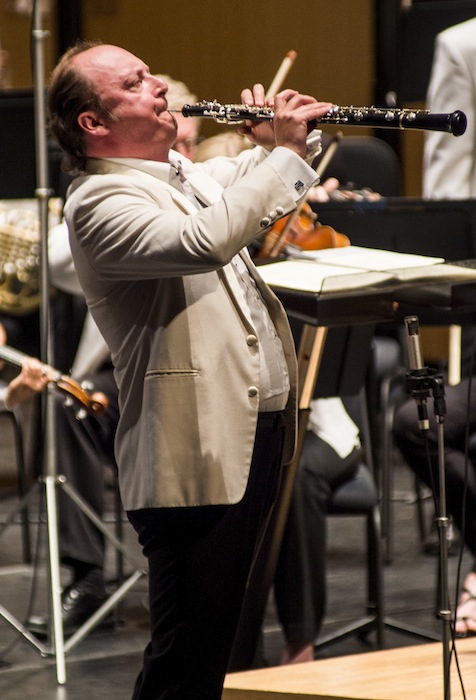Grant Park Orchestra goes underground for engaging program

For Chicago classical audiences, the best thing about Lollapalooza is that the annual rock and pop event pushes the Grant Park Music Festival literally underground. Worthy as the Pritzker Pavilion’s amplification system is, there’s no substitute for hearing a full symphony orchestra unplugged in a companionable indoor acoustic.
It’s no secret that the Grant Park Orchestra has grown into a superb ensemble under the leadership of artistic director and principal conductor Carlos Kalmar. But for one weekend every summer when the festival treks down to the Harris Theater one can really hear what a terrific orchestra it has become.
On Friday night one was struck by the tonal gleam and refinement of the strings, the varied colors of the winds and the corporate power of the brass in a program performed in a venue that allowed all the myriad qualities of the ensemble to truly bloom.
In a typically quirky bit of Kalmarian programming, the evening opened with a pair of contrasted mid-20th century works by German composers. As the conductor noted in his witty introduction, Paul Hindemith did himself no favors with his utilitarian titles, which likely account in part for his music’s relative neglect.
Still, Hindemith’s Concert Music for Strings and Brass is a surely crafted, glorious piece of music. In the opening of the first section, the no-nonsense brass swamped the string lines but the balances were soon arighted. Rarely has this technically challenging music sounded as populist or as vividly characterized, with Kalmar leading a performance that brought supreme swagger to Hindemith’s tautly contrapuntal style.
Conversely, Richard Strauss’s Oboe Concerto is a late work, imbued with the contented lyricism of his “Indian summer” period.
Soloist François Leleux brought a bigger-than-life personality to this music, playing with a vibrant, slightly nasal tone that made for a pleasing and distinctive timbre. The cheerful Frenchman–husband of violinist Lisa Batiashvili–was an ebullient presence, swaying to the music and constantly in motion, even perching at the edge of the stage.
Perhaps the reflective Andante would have benefited from more of the intimate expression that Leleux explored near the end of that movement. That quibble apart, Leleux delivered a virtual seminar, bringing a fresh, playful quality that suited this capricious score ideally. Leleux’s long, sustained phrasing was rendered with remarkable fluency and he played with the natural ease of one whose technique is complete, in a spirited and captivating performance. With responsive accompaniment under Kalmar, the orchestra musicians were equal and fully engaged partners.
The cheers and–for once, deserved–instant standing ovation brought Leleux back out for an encore of one of Gilles Silvestrini’s Six Études for Oboe. Leleux blazed through the insane challenges and multiphonic voicings of “Boulevard des Capucines” with conversational ease, as unruffled as if he were sipping a claret in a cafe on the Seine.
The second half of the program offered an equally deft pairing of two sea-inspired works, one a repertory cornerstone and one rarely heard.
The latter was Mendelssohn’s Calm Sea and Prosperous Voyage. Once a concert mainstay, Mendelssohn’s Goethe-inspired concert overture has long fallen into neglect.
It’s hard to fathom–no pun intended–why that is, given the rich and eloquent reading heard Friday night. Despite loud unmuffled coughing by some audience members who seemed to think they were still in Millennium Park, the musicians brought a hushed, almost spiritual quality to the opening section, Kalmar drawing the placid music out spaciously. The ensuing seafaring theme went with apt nautical fervor and Kalmar negotiated the final section with fine skill, segueing from the majestic brass fanfares to the surprising, quietly effective glowing coda.
La Mer would be wholly lost at the Pritzker Pavilion these days amid the civic mayhem cacophony of helicopters and blaring police and ambulance sirens. An inspired idea then to save Debussy’s quasi-sea symphony for the Harris, where the fine balancing and clear sound made one wonder anew at the originality of the French composer’s scoring.
The musicians brought out the evocative shimmering of the breaking dawn with just the right hazy atmosphere, building to a majestic climax with the ebb and flow surely directed by Kalmar. The opening pages of “Jeux de vagues” (Play of the waves) could have been less tense, but the atmospheric coda was beautifully played and balanced. Kalmar whipped up a daunting tempest in the final section with superb playing across all sections of the Grant Park Orchestra.
The program will be repeated 7:30 p.m. Saturday at the Harris Theater. gpmf.org
Posted in Uncategorized


